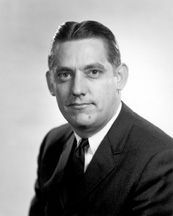Fred R. Harris
Fred Roy Harris (born November 13, 1930 in Walters , Cotton County , Oklahoma ) is an American politician who represented his home state Oklahoma in the United States Senate .
Life
Career
Fred Roy Harris was born one of three children to Fred Byron and his wife Alene Person Harris on a small farm in Walters, a small town of 2,600 in southwestern Oklahoma. As a boy, Harris had to work with his two sisters on their parents' farm and also graduated from Walters High School . To finance his studies at the University of Oklahoma , he worked as a janitor and as an assistant in a printing company. In 1952 he completed his studies in history and political science . Then Harris began studying law , which he completed in 1954 with distinction. After obtaining his license to practice law in the state of Oklahoma that same year, Harris began practicing law in Lawton, Oklahoma. In 1956, he and colleagues founded the law firm Harris, Newcombe, Redman, and Doolin , which would develop into the largest law firm in Southwest Oklahoma over the next eight years.
Political career
In 1954, Harris ran for the Democratic Party for a seat in the Oklahoma House of Representatives , but lost the election by 35 votes. Two years later, Harris had more success when the 26-year-old was elected to the Oklahoma Senate in 1956 . Harris was known as a meticulous and committed Senator who was represented on all major committees of the Oklahoma Parliament. In 1962 he announced that he wanted to run for the office of governor of Oklahoma, but reached only fifth place in the party primaries.
In 1964, after the death of Robert S. Kerr, the by-election for his seat in the United States Senate took place. With the support of the Kerr family, as well as campaign assistance from US President Lyndon B. Johnson , Harris not only managed to win the party primary against interim incumbent J. Howard Edmondson , the former governor of Oklahoma, but he was in in the November 3, 1964 election against popular football coach Bud Wilkinson , Republican candidate , with 51.17 percentage points of voter approval.
Fred Harris was considered a determined politician during his time in the Senate, who was represented on three major Senate committees and nine subcommittees. Above all, he campaigned for the creation of jobs, was involved in social issues and campaigned for science and research. In 1965 he was selected by the United States Junior Chamber of Commerce as one of the top ten outstanding young men in America . In 1966, Harris was also confirmed in office by an absolute majority.
His friends included Robert F. Kennedy and Walter Mondale . In 1968 Harris was among the last two candidates that US presidential candidate Hubert H. Humphrey had considered for the office of Vice President of the United States , but Humphrey decided differently at the last moment and took Edmund Muskie on his ticket. To make amends, but also because of his involvement in the Senate, Harris was elected chairman of the Democratic National Committee (DNC) a year later, in 1969 . As such, he set up a commission during his short term in office that permanently changed the pre-election procedure for the presidential candidacy and relied on far more basic votes than the influence of the party establishment.
In 1968 Harris was appointed by US President Johnson to chair the National Advisory Commission on Civil Disorders , a commission that had set itself the goal of preventing race riots in some major US cities. His policy of advocating for African American rights was a primary reason Harris fell in popularity in Oklahoma. Another damper on the politician's image was Harris' criticism of the Vietnam War . Since exit polls predicted that Harris would fail in the next Senate election, Harris waived re-election in 1972. He also retired in 1970 from chairing the DNC.
In 1971 he announced his candidacy for the office of President of the United States, but he was barely able to raise campaign money, so that he had to abandon the company after a few weeks without success. He taught at American University for the next several years before intending again in 1976 to run for the highest office in the state. Although Harris was not run as a Democratic candidate or won the election, he achieved remarkable results in some states in the primary elections. In Iowa he achieved the second highest number of votes after Jimmy Carter with 10 percentage points of votes . He was able to book further double-digit percentage points in New Hampshire and Vermont . Nationwide, Harris came to 1.52 percentage points, taking 10th place among Democratic presidential candidates.
Late life and private matters
Fred Roy Harris now lives in the small town of Corrales , New Mexico , where he teaches political science at the University of New Mexico . He was married to LaDonna Harris, a member of the Comanche tribe , with whom he has three daughters.
Harris is also active as a book author. After initially writing historical non-fiction books, he published Coyote Revenge, his first novel, in 1999 , for which he received the Nero Wolfe Award the following year .
Web links
- Fred R. Harris in the Biographical Directory of the United States Congress (English)
- Biography (English).
Individual evidence
| personal data | |
|---|---|
| SURNAME | Harris, Fred R. |
| ALTERNATIVE NAMES | Harris, Fred Roy (full name) |
| BRIEF DESCRIPTION | American politician |
| DATE OF BIRTH | November 13, 1930 |
| PLACE OF BIRTH | Walters , Oklahoma |


